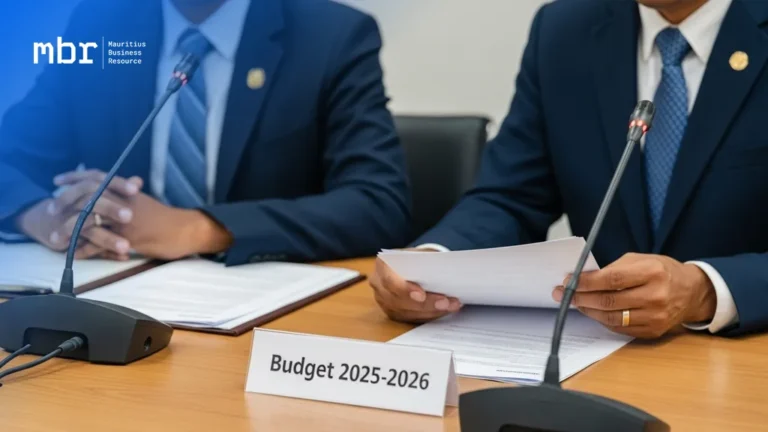The upcoming Mauritius Budget for 2025-2026 is a hot topic, and it can seem complicated with all the economic terms and figures. That’s why we’ve put together this simple and useful guide. Here, we’ll break down the key challenges Mauritius is facing, what the government is trying to do, and what it all means for you, whether you’re an employee or run a business. Let’s get started!
Mauritius Budget 2025-2026: A Big Test for the New Government
The new government of Mauritius, led by Prime Minister Navin Ramgoolam, Deputy Prime Minister Paul Bérenger and their “Alliance du Changement” party, is about to announce its first national budget. This will happen on Thursday, June 5, 2025. A nation’s budget outlines its revenue and expenditure plans.
This budget is critically important because Mauritius has some serious money problems. The country owes a lot of money – about Rs 644 billion. This is almost 90% of the total value of everything Mauritius produces in a year (this value is called GDP, or Gross Domestic Product).
Everyone is waiting to see if the new government can manage the country’s financial resources carefully (this is called fiscal responsibility) while still keeping its promises to help people (these are social promises), especially after the CSG fund crisis announcement. How they balance this will impact jobs, wages, the cost of living, and business health.
The Big Money Problems the New Government is Facing (And How They Affect You)
Tough Situation Handed Over
The new government says it took over a very poor money situation from the previous administration of Pravind Jugnauth. The Prime Minister called it “dire and unsustainable,” meaning it’s terrible and can’t continue. They need to make changes quickly, or a company called Moody’s might lower Mauritius’s credit rating.
- Moody’s is a major company that gives countries like Mauritius a “credit rating”—like a financial trustworthiness score. This rating is vital for Mauritius because a good score makes it cheaper for the country to borrow money and attracts foreign investment. A bad score can make borrowing expensive and deter investors, affecting funds for national development.
- Credit Rating: Think of this like a financial report card for the country. A lower rating makes it more expensive for the country to borrow money. This could mean less money available for public services that employees and their families rely on, or for projects that create jobs. The government is trying to avoid this, but it means they have to take tough steps to fix the money situation.
Spending More Than Earning (Fiscal Deficit):
The country is expected to spend much more money than it earns this year. This gap is the fiscal deficit. It’s now predicted to be 6.7% of GDP, way up from the planned 3.4%.
- Why is this a concern for employees? When the government overspends consistently, it can lead to cuts in public services, delays in public sector pay raises, or even fewer government jobs down the line. For businesses, it can mean higher taxes or less government spending that supports their industry.
- Why is the deficit bigger? The government spent about Rs 5 billion more than planned due to things like post-election pay raises and new free travel schemes, even though it spent less on big infrastructure projects (called capital expenditure).
Not Enough Money Coming In (Revenue Shortfalls) and Slower Growth
The government isn’t collecting as much money (this is called revenue) as it expected. This is mainly because less tax came from people’s salaries (personal income tax), company profits (corporate income tax), and the tax on goods and services you buy (Value-Added Tax, or VAT).
- Impact on you: If the economy grows slower and the government collects less tax, there’s less money for pay increases (both public and private sector), for improving public services like schools and hospitals, or for creating new jobs. Businesses might also see lower demand for their products or services. The economy is also not growing as fast as hoped, and past growth figures were actually lower than first reported.
Talking to People Before Making the Budget (Pre-Budget Consultations)
The government has been talking to various groups, including business associations and worker groups (trade unions), to get their input.
What Different Groups Want:
- Trade Unions (Worker Groups): They’ve pushed for things that could directly help employees, like cutting VAT from 15% to 10% (which would make things cheaper to buy). They also suggested increasing taxes on company profits and setting up a Rs 10 billion “rainy day” fund (stabilization fund).
- Businesses: They are keen on making Mauritius more competitive, supporting green energy (which could create new types of jobs), and making it easier to do business, which could encourage companies to hire more people.
Advice from the International Monetary Fund (IMF)
The International Monetary Fund (IMF), a global organization that advises countries on their economies, has also given its input. The IMF often recommends measures to control spending and improve tax collection. While these are aimed at making the economy stronger in the long run, they can sometimes mean short-term difficulties, like cuts in government spending that could affect public sector jobs or social programs.
What to Expect in the Mauritius Budget 2025-2026
Main Goal: Getting the Country’s Money Under Control (Fiscal Consolidation)
The government is signaling that being careful with money (fiscal discipline) is a top priority. The Prime Minister has warned that people might have to “ser sintir” (tighten their belts). This could mean tough budgeting measures – steps taken to reduce government spending.
- What “tightening belts” could mean: This is a critical point. It could translate to freezes on public sector hiring or wages, cuts to certain public services, or an increase in some taxes to raise more revenue. For businesses, it might mean less government contract work.
The Prime Minister’s Primary Objectives:
- Rolling out corrective actions against misuse of government funds
- Make government processes simpler (cutting red tape). This could help businesses grow and hire.
- Boost successful sectors like tourism and exports, which could create more jobs in these areas.
- Make government departments more accountable for their results (performance-based budgeting).
Balancing Social Protection and Economic Efficiency (Help People While Saving Money)
Even though they need to save money, the government is also being pushed to keep helping people, especially with the rising cost of living (this is called inflation). Many people support the continuation of financial assistance programs, such as monthly social allowances that certain individuals receive from the Mauritius Revenue Authority (MRA).
What This Means for Jobs and Businesses: Potential Impacts and Opportunities
Focus on Useful Investment and New Businesses: The budget might encourage investment in new businesses (startups) and Small and Medium Enterprises (SMEs).
- For employees: This could mean new job openings, though often in smaller, newer companies.
- For businesses: This could bring support and opportunities.
Looking Ahead: What Employees and Employers Should Consider
Get Ready for Policy Changes:
- Employees: Be prepared for potential changes in tax rules that affect your take-home pay (like income tax or VAT). Keep an eye on any announcements about wages, social benefits, or public sector employment.
- Employers: Expect possible changes in tax policy, regulations, and government spending priorities. The focus on performance and accountability might mean stricter rules but potentially better government services.
Opportunities in New and Growing Areas (Economic Diversification):
The government wants to support different types of businesses.
- Employees: This could mean new career paths are opening up. Think about what skills might be in demand (e.g., in tech, green energy, or specialized tourism).
- Businesses: This is a chance to innovate and explore new markets, especially in areas like exports and tourism that might get policy support.
In Conclusion: Pay Attention!
The Mauritius Budget 2025-2026 is very important for everyone in Mauritius. How the government balances saving money with helping the economy grow will affect your job, your income, and your business.
Make sure to follow the budget announcement on June 5, 2025. Understanding what’s in the budget will help you make informed decisions and navigate the evolving Mauritian economic landscape, whether you’re looking for job stability and growth or aiming to run a successful business.


